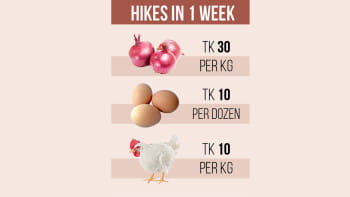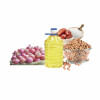Is commodity market competitive? Experts have different views

Syndication has become a buzzword among consumers in Bangladesh, particularly in relation to the abnormal price hike of essential commodities over the past several years.
Onion prices surged by about Tk 100 per kilogramme overnight in early December last year as traders started stockpiling the bulb following news that India had banned its exports till March 2024.
However, the prices eased in subsequent weeks as the government conducted market drives that found and penalised numerous traders across the country for hoarding the crop.
Consumers have also blamed businesses for over-profiting by using collusive efforts to induce sudden spikes in the prices of potatoes, chicken, beef, eggs, edible oil, sugar, and even dates in recent times.
Market analysts agree with this accusation, saying that it results from a lack of competition.
"A kind of oligopoly is at play in the country's market for imported essential goods," said Ghulam Rahman, president of the Consumers Association of Bangladesh.
"Competition is decreasing day-by-day due to the market mechanisms of some big companies. As a result, many small-and-medium traders have been driven out of the market," he added.
Citing a previous study, Mustafizur Rahman, distinguished fellow of the Centre for Policy Dialogue (CPD), said certain businesspeople are importing products using separate trade licences under different names.
In reality, just four or five businesses are importing significant quantities of essential products although documents show more than 50 traders are operating in the market, he added.
Rahman also said there are many barriers to entry for small and medium enterprises.
"The government should address these issues so that they do not face any problems in entering the market," he added.
Selim Raihan, a professor of economics at the University of Dhaka, said the Bangladesh Competition Commission (BCC) cannot effectively regulate the market as it is not properly empowered.
He alleged that certain business groups that engage in anti-competitive practices do so with the help of influential government officials.
"That is why the government never takes any effective action against them," Raihan added.
Towfiqul Islam Khan, senior research fellow of the CPD, said unlike the large corporates, small-and-medium traders are struggling to continue imports in the face of the ongoing US dollar crunch.
"Therefore, these big companies are gradually gaining more control over the market. This is not really helpful for the overall ecosystem," he added.
Mohammed Helal Uddin, another economics professor at the University of Dhaka, said the number of commodity importers and marketers will keep decreasing considering the effects of economies of scale and economies of scope.
Economies of scale posits that companies obtain cost advantages when producing a larger number of goods as the per-unit production cost decreases while output increases.
"So, big firms with large production capacities can enjoy such benefits," he said.
Meanwhile, economies of scope suggests that companies can avail cost advantages by producing a variety of related products.
"As such, big firms with diversified product lines enjoy this benefit as well," added Helal, who has authored various studies on competition in the edible oil and sugar markets in Bangladesh.
He also said a few players will remain dominant in such sectors, particularly the edible oil and sugar markets, as small-and-medium traders lack the technology and efficiency to keep up with large corporates.
"What is important is to see whether these firms are engaged in competitive practices," he said.
"But if the number of players increases while their efficiency does not improve, then product costs will rise," Helal added.
AK Enamul Haque, a professor of economics at East West University, said advancements in technology have helped decrease the overall input costs involved with mass production.
As a result, average commodity prices, namely that of edible oil, are being kept comparatively lower thanks to the presence of big players in the market.
"So, edible oil prices would increase if we shut the big refiners," he said, adding that big firms make good profits from their high sales volume and not the per unit price.
Haque also believes there has been no collusion among major commodity processors.
"We can say there is collusion when the market share of each player remains static for several years. In our country, the market share is not fixed. So, it is hard to believe there is collusion," he said.
"New players are entering the market and significant collusion is difficult in a growing market like ours," Haque added.
Bashundhara Group, a local conglomerate, and Pran Foods, the country's largest agro-processor, set up facilities to process edible oil and other essential goods in recent years.
Haque, also dean of the business and economics faculty at East West University, said market competition could be affected for various reasons.
"It is important to enforce competition law to prevent firms from conducting non-competitive practices," he added.
To remedy the situation, the CPD's Rahman suggested the government strengthen the BCC.
In a report last year, the CPD said the BCC should take a strong stance against cartels or syndicates and take a zero-tolerance stance against collusive practices.
Besides, the Competition Act 2012 should be revised to address monopolies and include specific antitrust clauses and concrete penalties for violators, it added.
Mofizul Islam, a former chairperson of the BCC, said any government agency has to have four things -- policy support, infrastructure, budget, and skilled manpower -- to deliver desired results.
"But In the case of the BCC, there is a severe deficit in all four areas. As such, the commission is unable to produce the expected results," he added.
Citing how Bangladesh will eventually become a developing country with a growing economy, Islam urged the government to more seriously address issues related to market competition.
Pradip Ranjan Chakraborty, current chairperson of the BCC, said they agree with the observations made by experts regarding the commission's activities.
He informed that a project has been taken to strengthen the commission from all sides, with a proposal in this regard having already been sent to the Planning Commission.
"If the project is implemented, it will have a positive impact on market management," he added.
Chakraborty also said the Finance Division believes strengthening the commission is very important given the current market scenario.
Regarding the BCC's efforts so far, he said many companies have been sued by the commission.
"Some of these cases have been settled with fines while others have been taken to the appellate authority for appeal. Some other cases were released only with observation," Chakraborty added.

 For all latest news, follow The Daily Star's Google News channel.
For all latest news, follow The Daily Star's Google News channel. 






Comments